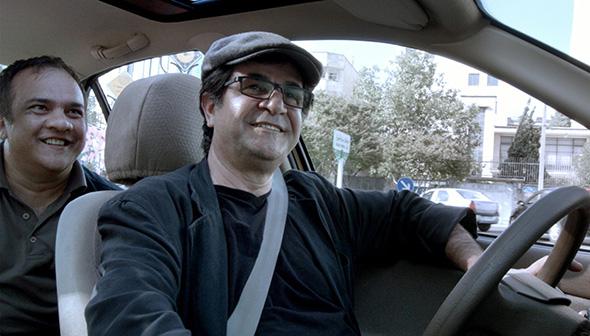How much do movies matter to you? Director Jafar Panahi was thrown in jail by a harsh theocratic regime that then banned him from movie-making for the next 20 years. Since then he’s made three internationally acclaimed films in less than five years. Panahi, the Iranian filmmaker who first became known in the West for the 1995 art-house hit The White Balloon, has become an international symbol of the power of dissident art simply by continuing to find ways, even under the most restricted circumstances, to make art from whatever he has at hand.
This Is Not a Film—the 2011 release that kicked off the post-arrest phase of Panahi’s career—was shot almost entirely inside the director’s own apartment building, where he combined real events from his day-to-day life with other, apparently scripted segments to shape the narrative of a single fictional day. His next film, Closed Curtain (co-directed with Kambuzia Partovi), also combined real and fictional events into a semi-autobiographical story.
Five years after Panahi’s arrest, restrictions on his movements have apparently relaxed enough that he can get behind the wheel of a yellow cab. At any rate, in his new film, Taxi, that’s where the director spends nearly every minute, lightly disguised in a pulled-down snap-brim cap as he ferries various Tehran residents—some previously known to him, some not—to their destinations around the city.
It soon becomes clear that the cab’s real purpose is to function as a mobile movie set: Panahi’s way of taking his camera out into the world while also bringing the world to him. The camera’s perspective never leaves the car, though it can shoot from several different angles within the vehicle, thanks to a swinging-arm device that’s mounted on the dashboard. In a structure that calls to mind such modern Iranian classics as Abbas Kiarostami’s Ten and Taste of Cherry (both episodic stories that take place almost entirely inside moving cars), customers, friends, and relatives enter and exit the cab over the course of an afternoon, sometimes overlapping with one another. A dealer in black-market foreign DVDs recognizes the director not only as a public figure but as a former customer and is delighted by his cab-driving prank (even if, like the audience, the merchant can’t quite suss out which elements of his own ride have been staged and which are real). Another young man gets in the front seat and immediately begins a fulminating speech in favor of the death penalty and sharia law, while a lady who was already in the back refutes him point for point.
Around the movie’s halfway point, Panahi gets a kind of sidekick: He picks up his 11-year-old niece, Hana, at school and chauffeurs her around for the remainder of the movie. In between picking up fares, they chat about Hana’s homework assignment: a short film that’s supposed to adhere to Iranian censorship rules by keeping women in veils, limiting contact between the sexes, and avoiding “sordid realism.”
Taxi’s own version of cinematic realism is far from sordid. The director’s eye on the world as seen from his cab is nonjudgmental and mildly amused, and he shows far more interest in documenting the nondescript than the tawdry. But I never forgot that Taxi is a subversive piece of underground filmmaking; for all its lighthearted banter and formal playfulness, the film maintains an undercurrent of anxiety and danger. As their afternoon together draws toward an end, Panahi and his niece pick up a woman they seem to know, a lawyer (played by real-life human-rights attorney Nasrin Sotoudeh) who explains that she’s on her way to visit a hunger-striking client in jail. The only crime of her client—a young woman—was sneaking into a volleyball game dressed in male clothing, an infraction very like the one committed by the fictional group of girls whose story Panahi told in his 2006 film Offside. This suggestion of contiguity between the filmic world and the real one is reinforced by the fact that both Sotoudeh and Panahi went on well-publicized hunger strikes during their own time in prison.
The details of any given film, including Taxi, may or may not be invented, but the effects of living in a culture of political repression and censorship are distressingly real. When Panahi flinches at a sound on the radio that, he says, reminds him of his former interrogator’s voice, his understated reaction is more powerful than any flashback re-enactment could be. The worst part of the religious regime’s power, observes the sympathetic Sotoudeh before jumping out of the cab, is that once their voices have gotten inside your head, they have a way of turning the whole world into a jail cell.
What’s been extraordinary about Panahi’s prolific output in the five years since his arrest has been his quiet refusal to submit to that form of domination. He keeps managing to find or invent his own space of artistic freedom, even if it’s no bigger than the interior of a yellow cab.
